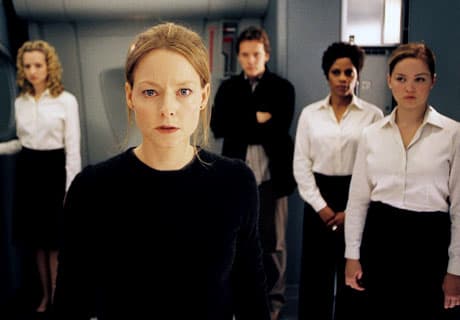The biggest of Flightplan's many disappointments is that all the cheap narrative trickery that's used to keep its main character in the dark comes with such an outlandish payoff.
Jodie Foster plays a sad woman on a transatlantic flight home from Europe. Mid-flight, she wakes up to find that the daughter she thought she'd brought along is missing and no one on the plane believes she even had a daughter.
There's some interesting camera work in the first third of the film angles consistently isolate the daughter character, placing visual barriers between her and characters that may be able to validate her existence later. This formal device is about the only thing that makes her subsequent disappearance plausible, but it also sets the filmmakers a task that they never fully rise to: resolve the disappearance in a way that underscores, rather than is at odds with, the earlier stylistic choices. And for a precious few moments, there's hope that the solution, be it naturalistic or metaphysical, will rise to that challenge. Sadly, it does not.
Once that becomes clear, director Robert Schwentke's film crumbles into a cloud of its own ludicrous clichés, not the least of which is a criminal mastermind who in a final moment of confidence exposes all the details of his sinister plan to the one character who may be able to stop him.
There are a couple of things to like here. Jon Title's sound design accurately relays a plane's various hums and grinds. And considering the film is set almost entirely on a plane, there's a surprising amount a variation in setting the pace. But none of this is enough to save the film from its underwritten script (co-written by Shattered Glass scribe Billy Ray), which is big on promises and short on resolution. (Touchstone/Buena Vista)
Jodie Foster plays a sad woman on a transatlantic flight home from Europe. Mid-flight, she wakes up to find that the daughter she thought she'd brought along is missing and no one on the plane believes she even had a daughter.
There's some interesting camera work in the first third of the film angles consistently isolate the daughter character, placing visual barriers between her and characters that may be able to validate her existence later. This formal device is about the only thing that makes her subsequent disappearance plausible, but it also sets the filmmakers a task that they never fully rise to: resolve the disappearance in a way that underscores, rather than is at odds with, the earlier stylistic choices. And for a precious few moments, there's hope that the solution, be it naturalistic or metaphysical, will rise to that challenge. Sadly, it does not.
Once that becomes clear, director Robert Schwentke's film crumbles into a cloud of its own ludicrous clichés, not the least of which is a criminal mastermind who in a final moment of confidence exposes all the details of his sinister plan to the one character who may be able to stop him.
There are a couple of things to like here. Jon Title's sound design accurately relays a plane's various hums and grinds. And considering the film is set almost entirely on a plane, there's a surprising amount a variation in setting the pace. But none of this is enough to save the film from its underwritten script (co-written by Shattered Glass scribe Billy Ray), which is big on promises and short on resolution. (Touchstone/Buena Vista)
